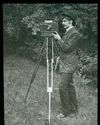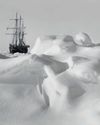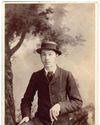This time of year is perfect for photographing seasonal wildlife such as hares, waders and squirrels. Top nature photographers John and Tracy Langley share their best tips

Do you remember when you were young and the first fall of snow had you dashing outside to build a snowman or go sledging with your friends? The onset of winter is still an exciting time, only by now many of us have swapped our sledges for cameras. As the cold of winter sets in, a covering of frost or a blanket of snow can transform the landscape. Capturing images of our native wildlife during this time can be a challenge, but it’s a rewarding one.
There are some advantages to winter photography, especially for those who find early rising difficult, as sunrise happens much later than in summer. Winter days with clear skies allow plenty of high-quality light for shooting, and the low aspect of the sun at this time of year means you can shoot all day without the harsh shadows we encounter at midday in the summer. During winter it’s interesting to concentrate on animals that exhibit a difference in behaviour, pelage or plumage from the rest of the seasons. For example, species that change colour in the winter, or those who become more confiding due to pressures for survival.
Mountain hares
One of the most striking seasonal changes can be seen in mountain hare populations. In the summer months they have a greyish-brown coat, which moults out to a white or grey winter coat. One of the first things to do when planning a photo shoot is to research your quarry. You can use books, the internet, television documentaries or just spend some time watching them in the field. The knowledge gained from these sources will help you to anticipate their behaviour and allow you to previsualise some of the images you’d like to capture. A good exercise is to create a wish list of shots, either written down or carried in your head. This will help you to structure your time with the subject, rather than ambling about aimlessly and failing to achieve your goals.
This story is from the {{IssueName}} edition of {{MagazineName}}.
Start your 7-day Magzter GOLD free trial to access thousands of curated premium stories, and 9,000+ magazines and newspapers.
Already a subscriber ? Sign In
This story is from the {{IssueName}} edition of {{MagazineName}}.
Start your 7-day Magzter GOLD free trial to access thousands of curated premium stories, and 9,000+ magazines and newspapers.
Already a subscriber? Sign In

140 years of change
AP has become the world’s oldest surviving consumer photo magazine because we have moved with the times, says Nigel Atherton

Preserving history in platinum
A deep dive into the meticulous art of platinum printing, and the collaboration between the Royal Geographical Society and Salto Ulbeek. Mike Crawford explores how they brought historical photographs to life with enduring beauty and precision

Life in the past lane
What was life like for an amateur photographer in 1884? John Wade takes a trip back in time

Choice cuts
How many trillions of photographs must have been taken in the past 140 years? Amy Davies asked some of our regular contributors for their favourites....a difficult task, to say the least

How good a camera can you buy for just £140?
Three members of the AP team see what they can find for the money

Round Five: The Best of the Rest
The APOY judges choose their favourite images that didn’t make the top ten of our Landscapes category

Amateur Photographer of the Year
Here are the top ten images uploaded to Photocrowd from Round Five, Landscapes, with comments by the AP team and our guest judge

FILM STARS A lifetime of landmarks
Cameras that hit the headlines between then and now. John Wade is your guide

140 years of Amateur Photographer
As AP celebrates its 140th birthday next month, Nigel Atherton looks back at its glorious past

John Wade considers...World War II: Home Front 1940, by A.J O'Brien
Say the word 'Wall's' to those of a certain age and two things spring to mind: sausages and ice cream.